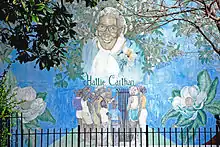Hattie Carthan
Hattie Carthan ( September 1900 – April 22, 1984) was a community activist and environmentalist who was instrumental in improving the quality of life of the Brooklyn, New York community of Bedford-Stuyvesant.
Hattie Carthan | |
|---|---|
 Mural depicting Carthan at the Magnolia Tree Earth Center in Brooklyn, New York | |
| Born | September 1900 |
| Died | April 23, 1984 |
| Occupation | Community activist |
| Years active | 1964-1984 |
Biography
Originally from Portsmouth, Virginia, she moved to Brooklyn in 1928. After her and her husband split, she remarried in 1943. She later separated from her second husband in 1954 while working as a field interviewer for a market research company.[1]
Carthan moved to the tree-lined block of Vernon Avenue between Tompkins Ave and Throop Ave in Bedford-Stuyvesant in 1953. By 1964, only three trees remained due to the deterioration of the neighborhood at that time.[2] She sent postcards to everyone on her block and formed the T & T Vernon Avenue Block Association, which raised funds to buy and plant trees by throwing block parties.[3] The City of New York supported her efforts: Mayor John Lindsay attended one of the block parties, and the City Parks Department provided trees under its tree matching program.[2]
Carthan founded the Bedford-Stuyvesant Beautification Committee in 1966.[4] As chairman of the organization, the Beautification Committee was awarded a grant in 1971 to teach youth about tree care and provide a stipend for summer work, known as the Neighborhood Tree Corps.[5][6] She oversaw over 100 block associations which planted over 1,500 trees including those of the ginkgo, sycamore, and honeylocust varieties [2]
When a 40-foot Magnolia grandiflora tree that was thriving far north of its natural habitat, was threatened to be cut down for an apartment complex in 1968, Carthan spearheaded a campaign to save the tree. She raised the funds to construct a protective wall behind the tree to shield it from a planned parking lot and it was designated by City Landmarks Preservation Commission as a living landmark. The remaining brownstones intended to be town down for the apartment complex were purchased in 1976 for $1,200 and became the Magnolia Tree Earth Center of Bedford- Stuyvesant Inc, an educational center.[2][7][5]
In 1975, she was honored by Parks Commissioner Edwin L. Weisl Jr. for distinguished service to the city of New York.[1]
Death and legacy
She died on April 22, 1984, in Bedford-Stuyvesant.[7]
Hattie Carthan Community Garden Farm
In 1985, a vacant lot started to be revitalized into a community garden which eventually was renamed Hattie Carthan Garden in 1998 to honor and continue the work of Hattie Carthan.[6] In 2009, under Yonnette Fleming's leadership, the garden expanded to become the Hattie Carthan Community Garden Farm.[8]
References
- Evans, Olive, "For a 'Tree Lady,' A City's 'Thank you'", "The New York Times", May 20, 1975
- Ferretti, Fred, "Urban Conservation: A One-Woman Effort", "The New York Times," July 8, 1982
- Carthan, Hattie, "Our Pleasure," Letter to "New York Amsterdam News," November 5, 1966
- Nolan, Kenneth P. (1972-01-09). "Bed‐Stuy Children Learn How to Nurture Trees". The New York Times. ISSN 0362-4331. Retrieved 2019-04-28.
- Lake, Edwin B. (1977-07-24). "A Magnolia Grows in Brooklyn With Help From the 'Tree Lady'". The New York Times. ISSN 0362-4331. Retrieved 2019-04-28.
- "Historical Sign Listings : NYC Parks". www.nycgovparks.org. Retrieved 2019-04-28.
- Rule, Sheila, "Hattie Carthan, 83, Proponent of Trees in Brooklyn, Is Dead", "The New York Times," April 28, 1984
- "hattiecarthan-market | OUR HISTORY". hattiecarthan-market. Retrieved 2019-04-28.